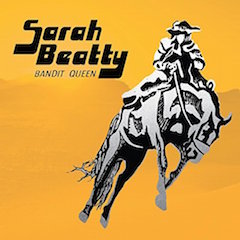![Songs From The Heart and The Headlines 1 Sarah Beatty: ‘You sit down and you reveal yourself to the world [in songwriting], but at the same time, the world reveals itself to you.’](https://deeprootsmag.org/wp-content/uploads/2017/04/sarah-beatty1.jpg)
Sarah Beatty: ‘You reveal yourself to the world [in songwriting], but at the same time, the world reveals itself to you.’

BANDIT QUEEN
Sarah Beatty
King of the Road Records
Sarah Beatty’s Bandit Queen album neither needs nor offers apologies for itself. From the first track through the last, it lays out challenges and rewards for even a casual singer-songwriter fan: trainsong rhythms, slow and fast; slow blues and angry heartbreak; politics and pop culture; Latin-infused swing and American folklore. That Beatty succeeds in juggling all this without a trace of slapdash, kitchen-sink pastiche says much about the Hamilton, Ontario native’s confidence in herself and in her audience.
Start at the beginning, of course. The subtle opener, “Slaves and Kings,” might have appeared on a Simon & Garfunkel playlist, circa the “Scarborough Fair” era–chimes, soft guitars and vocal, brush drums and lyrics like these: I came up for a breath/I came up for a breath/All I could hear were things the ocean said/I kept a knife between my teeth, every time I went to sleep/How was I to know, oh how was I to know?
https://www.youtube.com/watch?v=xls0dVOGjTc
Sarah Beatty, a live version of ‘Slaves and Kings’ from her Bandit Queen album
I thought I recognized the phrase slaves and kings from somewhere else. A Google search told me, yeah: I’ve probably encountered that pairing of opposites too often to nail down to a single source. I asked Beatty, via email, if she herself meant it as an allusion.
“I didn’t have a particular writing in mind when I was writing ‘Slaves and Kings,'” she said. “But I have been pretty taken with clichés as of late, and this class/hierarchy apparent separation of people based on wealth (financial or otherwise) has been on my radar for some time.” She went on, “You sit down and you reveal yourself to the world [in songwriting], but at the same time, the world reveals itself to you. Sometimes, in that space, especially when you’re in stream of consciousness territory, you don’t actually have the conscious or technical knowledge to make sense of a message or know where it came from.”
From the evidence in “Slaves and Kings,” Beatty doesn’t need her lyrics to rhyme just for rhyming’s sake, nor does she feel obliged to squeeze them into formal, metronomic straitjackets. They often sprawl languidly from one line to the next, bound only by continuity of thought and narrative–little if any free-association in them.
And obviously, she’s comfortable pulling her songs from the heart. But she also draws from more immediate daily headlines, for songs like “Holy Smokes” (a Millennial’s distress call). I bet its refrain, set to a jaunty, quasi-Dixieland arrangement, makes for an enthusiastic–if rueful–singalong for audiences new to adulthood:
You’re just a boomerang kid
What you gonna be,
Now that you’re all grown up
With your letters, with your degree?
You’re indebted to the bank
You’re indebted to your folks
You’re indebted to the government
That’s a lot, holy smokes.
She doesn’t shy away from topical commentary on environmental issues, in particular. “Prehistoric Sludge” presents an urgent lesson about the dangers of carbon-based energy, explicitly referencing shale, fracking and the eons-long processes by which natural gas is formed in the first place. She comes by this urgency honestly: her musical career has developed alongside a scientific one. With a 2016 PhD in environmental science, Beatty has presented papers on soil wettability and repellency at international conferences. This has given her the opportunity to perform for live audiences while she’s overseas, honing her skills on both kinds of stage.
‘Prehistoric Sludge,’ Sarah Beatty, from Bandit Queen.’It took me twelve years and a PhD to understand how to write ‘Sludge,’’ Beatty says.
“Artists and scientists are not so different in this way,” she says, “finding the truth or beauty of a matter and sharing that with people with the language that’s available to them, be it sonic, scientific, or something else.
“It took me 12 years and a PhD to understand how to write ‘Sludge,’” she adds.
And it’s obvious that she does develop an easy rapport with live audiences. One of the songs on Bandit Queen, “Wild Rose,” sings of a woman water-truck driver in Alberta–“spreading sand when it’s down near 40 below/and water in the summertime.” One of my favorite tracks, “Just Like Me,” presents a lyrical scenario bitterly familiar to anyone who’s gone through a difficult breakup: two lovers trying, unsuccessfully, to convince each other (and themselves) that they’re acting sensibly: Use big words, with no meaning/Zombie nouns got no feeling… We’ll keep looking at things till we both understand. Beatty’s voice throughout this number really shines–I heard crystalline vocal effects I’d resigned myself to hearing for the last time when Linda Ronstadt retired.
‘Just Like Me,’ Sarah Beatty, from Bandit Queen
In the lyrics here, Beatty-the-songwriter stands out: repeated imagery (an old house, dirt, rainwater and floods, the open palms of the lovers’ hands on each other’s faces) twines about not only within verses but back and forth among them, coming effectively but not quite full circle in the last. It’s hard not to admire the sheer craft in a song like this.
Asked about vocalists who may have shaped her approach to singing, she doesn’t mention Ronstadt. But she says she’s always been “drawn to soulful singers. Janis Joplin, Billie Holiday and Patsy Cline are probably the big three, and in equal measure.” (In other interviews, she’s mentioned Joni Mitchell and Ani DiFranco. I’m pretty sure I heard Melissa Etheridge on this album, too, especially in the angry breakup song “Fee Fi Fo Fum.”)
Bandit Queen isn’t Beatty’s debut; that was 2012’s straight-up acoustic (and almost entirely solo) Black Gramophone. Each track on that album was recorded in a single take. In 2015, she followed up with a “sampler” EP, Soft Geography, featuring six tracks: two recordings each of three songs. The three songs first appear in acoustic arrangements, similar to Gramophone‘s approach; then she presents them in more fully “produced” versions, with accompanists and studio mixings. It seemed so obviously a progression, from simple to complex–maybe a learning experience, intentional or otherwise, en route to Bandit Queen?
“It’s all an experiment and it’s all learning,” she confirmed. “Black Gramophone was an investigation/experiment with concision. What are the essential parts of a song, and can I hang in a place where it’s just me and a microphone? A total exercise in restraint. I didn’t realize it at the time, but Soft Geography was a part of me building up different sonic and studio muscles that I’d eventually need for Bandit Queen.”
She closes out her new album by taking a similar approach to the title song. Here the order is reversed: the “Bandit Queen” that appears first is given a full-fledged big-band treatment, with horns, multiple drum effects–the works. Take #2 strips that all away, to just Beatty and her guitar. I don’t know in what order the songs were written or actually recorded, but the first version serves as a terrific wrap-up of everything that precedes it on the album–sort of a “Here’s what I know now that I didn’t know then” assertion. And yet the solo acoustic stands out as a single; indeed, it’s the version Beatty chose as the album’s debut single.

Myra Maybelle ‘Belle’ Starr, the Bandit Queen
The “bandit queen” of the title was Myra Maybelle “Belle” Starr, née Shirley, a very real outlaw in nineteenth-century Old-West America. In a fairly genteel upbringing, she learned to play the piano and graduated from a “female academy” in Missouri. Later in life, though, Starr got mixed up with the notorious James and Younger gangs. With them and other rough types, she cut a swath through Texas, Arkansas, and Oklahoma, robbing stagecoaches, stealing horses, rustling cattle, bootlegging and bribing police officers. She was shot dead in 1889, allegedly by a man she’d had beaten for abusing her favorite horse. (Of course, Hollywood and TV couldn’t resist this story. She’s been presented both realistically, in rough-edged form, and in more glamorized manner by actresses like Gene Tierney, Florence Henderson, and Elizabeth Montgomery.)
The tale in Beatty’s “Bandit Queen” comes to us in first-person voice: I’m a well-dressed, fast talking, educated woman, she sings, with 40 dead men in sight. The chorus lays it out, in case you missed the point: I’m the baddest bandit queen you did ever see/I am Myra Maybelle Shirley Starr, hotter than top rail kerosene/I’m the baddest bandit queen you did ever see.
One of the most striking charms of this song, in both the acoustic and the fully “produced” forms, lies in that last syllable. Beatty doesn’t merely sing the word see; she protracts it, spreads it out over maybe 20, 30?–I lost count–separate ee syllables. In the full, more rapidly paced version, this turns into an apparent commentary of its own: Starr’s sheer laughing pleasure (…hee hee hee… hee hee hee… hee-hee-hee) at finding herself in just the right niche in life.
The title track from Sarah Beatty’s Bandit Queen, in its acoustic version on the album. The song’s subject is Belle Starr and her Old West exploits and legend.
The ‘produced’ version of ‘Bandit Queen’ from the like titled album by Sarah Beatty
Bandit Queen is not a perfect album. As her musical career develops, Beatty may need to guard against overusing a couple of her most striking assets: First, I took great pleasure in vocal flourishes like the ee-ee-eees in “Bandit Queen’s” chorus, and it seems obvious that Beatty enjoys them, too. But she employs similar tricks in a couple of other songs on this album (as she did on Black Gramophone). I hope she continues to wield that charm sparingly. Second, in her topical songs, she may–I’m undecided on this point–need to approach her subjects more indirectly, less didactically, maybe via narrative rather than exposition.
But by just about any measure–lyrically, in arrangements, and vocally–Bandit Queen confirms the arrival on the scene of a sharp, witty, passionate talent. I genuinely look forward to what follows. –By John E. Simpson


